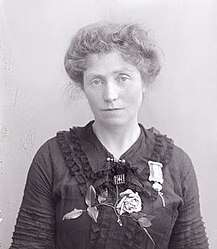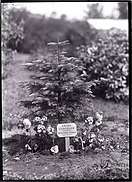Winifred Jones (suffragette)
Winifred Jones (died 1955) was an English suffragette.[1] Despite multiple arrests as a result of violent protest, she continued to persevere in her efforts for change.
Early life

Jones was born in Spittal’s Lodge, Chesterfield, Derbyshire. Her father was a solicitor, and her sister, Gladys Jones, became a playwright, under the name Gwen Jones.[1]
Activism
In 1909, David Lloyd George, then Chancellor of the Exchequer, visited Newcastle to gain public backing for his ‘People’s Budget’, which aimed to introduce a new welfare program.
On Friday the 8th of October, Christabel Pankhurst and Constance Lytton met other suffragettes to finalise their plans for protesting at Lloyd George's public meetings, and to discuss what would happen if they were arrested. Jones is likely to have attended the meeting.[2]
The following day, suffragettes protested at the public meetings, some using militant action. Jones was arrested for damaging windows at the Palace Theatre. This was her first arrest.[1]
Following her arrest, Jones and other arrested suffragettes wrote an open letter to the Times[1] which included the lines:
“We appeal to the Government to yield, not to the violence of our protest, but the reasonableness of our demand.”[2]

In 1910, Jones was visited by suffragette Adela Pankhurst when Pankhurst visited Chesterfield.[2]
In that year, Jones was arrested again, alongside Beatrice Saunders, for deliberately damaging No. 10 and 11 Downing Street, the headquarters of the British Government. She was imprisoned for a month.[1]
Jones spent time at Eagle House after her arrest, in a summer house called ‘The Suffragette’s Rest’.[3] She planted an abies concolor in the house’s garden on 2nd July 1911[1].
Jones is recorded on the National Archives' Roll of Honor of Suffragette Prisoners 1905-1914.[4]
Later life
During the 1920s, Jones lived in Lincoln’s Inn, London with her sister, playwright Gwen Jones.
Gwen Jones was authored a play titled 'Gloriana', about Queen Elizabeth I. The Jones siblings worked alongside suffragettes Agnes and Millicent Fawcett to pay for the statue of Elizabeth I in St-Dunstan’s-in-the-West Church, London, to be repaired.
Jones died in 1955.
References
- "Winifred Jones · Suffragette Stories". suffragettestories.omeka.net. Retrieved 2020-05-12.
- Lytton, Constance (2011). Prisons and Prisoners: Some Personal Experiences. Cambridge: Cambridge University Press. ISBN 978-0-511-69476-9. OCLC 889952010.
- "Annie's Arboretum · Suffragette Stories". suffragettestories.omeka.net. Retrieved 2020-05-12.
- "Roll of Honor of Suffragette Prisoners 1905-1914". The National Archives. 1960. Retrieved 2020-05-12.